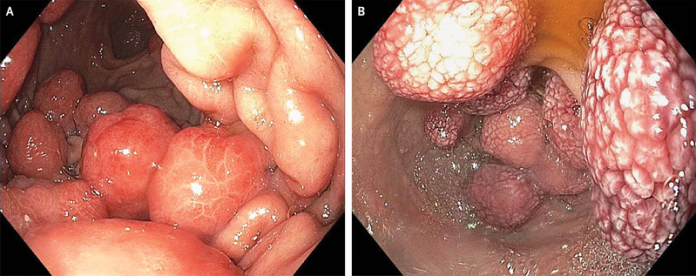- Myeloid sarcoma is a malignant neoplasm that is located outside the bone marrow.
- The tumour can develop in any area of the body including the skin, lymph nodes, small intestines, mediastinum and cervix.
A 59-year-old male patient presented to the primary care clinic with abdominal pain after eating. He had been experiencing this pain since the last 3 months. In addition to this, he had a history of acute myeloid leukemia and immune thrombocytopenia. Similarly, 2 years before presentation, he underwent allogenic hematopoietic stem-cell transplantation.
A bone marrow biopsy sample was obtained 4 months before presentation. Analysis of the biopsied specimen revealed 100% donor chimerism. Chimerism is a state in which the donor cells have engrafted durably in the recipient. Full donor chimerism means that 100% of the bone marrow and blood cells are of donor origin. Whereas, mixed or partial chimerism means that there is a presence of recipient cells.
On physical examination, the abdomen showed diffuse tenderness on deep palpation. Findings from laboratory studies included a white-cell count of 3640 per cubic millimeter (normal range, 4500 to 11,000), a hemoglobin level of 10.6 g per deciliter (normal range, 13.5 to 17.5), and a platelet count of 16,000 per cubic millimeter (normal range, 150,000 to 400,000).
Esophagogastroduodenoscopy showed multiple polypoid masses in the stomach and duodenum. A biopsy specimen was obtained and sent for histopathological analysis. The findings were consistent with myeloid sarcoma. Flow cytometry and immunohistochemical staining confirmed the diagnosis and showed evidence of relapse. Genetic testing further showed TP53 variants, which were also previously detected in the bone marrow sample. In addition, new somatic mutations with MF1 and ASXL1 variants was also evident.
The findings were consistent with the diagnosis of myeloid sarcoma of the gastrointestinal tract. Myeloid sarcoma is a solid tumour that manifests as acute myeloid leukemia. The sarcoma can occur in the absence of blood or bone marrow disease.
The patient was started on treatment with azacitidine and venetoclax.
References
Pasricha, T. S., & Abraczinskas, D. (2020). Gastrointestinal Myeloid Sarcoma. The New England Journal of Medicine, 383(9).




